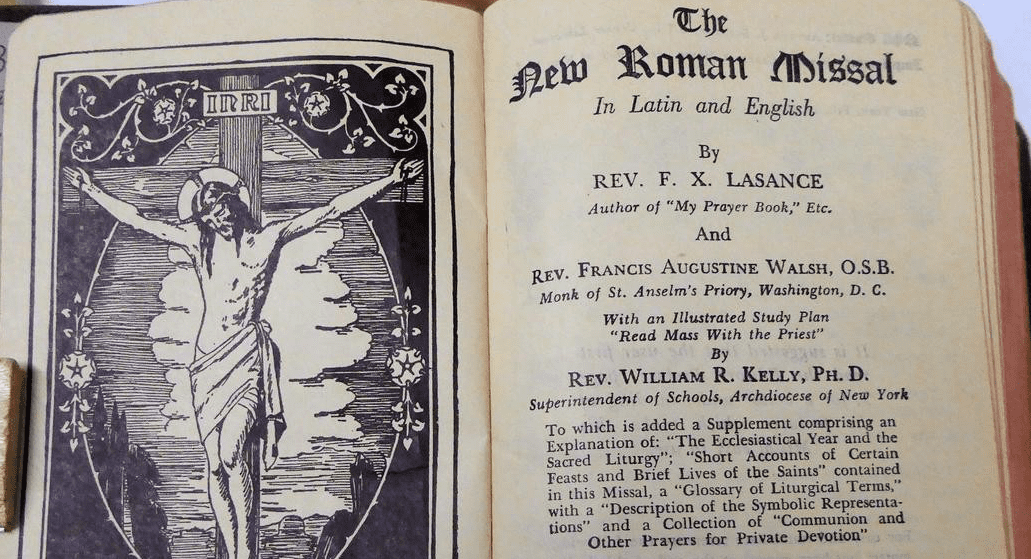Online Edition:
April 2009
Vol. XV, No. 2
Liturgical Translation Update:
US Bishops to Expedite Missal Approval; Postpone Lectionary Review
by Helen Hull Hitchcock
The Congregation for Divine Worship has asked the US bishops to “facilitate a more expeditious completion of the approval process for the English translation of the Missale Romanum, editio typica tertia, and see the publication of the Roman Missal in English by the end of 2010”.
This message was conveyed in a December 15, 2008 letter from Cardinal Antonio Cañizares Llovera, Prefect of the CDW, to Cardinal Francis George, president of the US Conference of Catholic Bishops (USCCB), as reported in the February 2009 Newsletter of the US Bishops’ Committee on Divine Worship (BCDW).
Cardinal Cañizares’s letter said that the USCCB’s approval of the Missal translation should be submitted to the CDW by November 30, 2009, and suggested “placing a lesser priority” on three sections of the Missal (Introductory Material, the Appendices, and the Antiphons) so that the approval process could be completed earlier than originally scheduled.
Although other ICEL member countries have approved all the new texts completed last year by the International Commission on English in the Liturgy (ICEL), the USCCB has approved only two of the thirteen segments of the Missal: the Order of Mass I, and the Proper of Seasons.
The BCDW Newsletter reports that “Cardinal George, in consultation with Bishop Arthur Serratelli and the members of the Committee on Divine Worship, sent an affirmative reply to Cardinal Cañizares’s request, noting that the USCCB desired to maintain the ‘American Adaptations’ to the General Instruction of the Roman Missal”. (The GIRM is in the Introductory Material). Cardinal George’s letter also mentioned that publication of the new Roman Missal in book form would take a year from the reception of the Holy See’s recognitio (approval).
Expediting the approval process will involve some changes in the USCCB’s scheduling for approving the ICEL “gray books” (final versions). At their June 2009 meeting, the bishops will consider four segments: Ordo Missae II, Ritual Masses, Masses for Various Needs and Intentions, and Votive Masses and Masses for the Dead. In November they will vote on the Proper of Saints and the Common of Saints. Also at that meeting they will review the Propers for the Dioceses of the United States of America.
The BCDW, “after a year of many developments”, has updated its timetable that charts the process of translating and approving the Missal texts. The new timetable appears on page 12 of this issue, with the permission of the BCDW. Periodic updates will be available on the Secretariat’s Roman Missal formation web site at www.usccb.org/liturgy/missalformation.
Preparing for the New Missal
To prepare for introducing the revised Missal, the February Newsletter reports, the BCDW will work with the USCCB’s “Task Force for Faith Formation and Sacramental Practice” to develop a “framework, timeline, and materials for the important catechetical formation to prepare priests and the faithful for the implementation of the revised translation of the Roman Missal”. The Newsletter also mentioned that the “Leeds Group” and the FDLC (Federation of Diocesan Liturgical Commissions) are also preparing “resources for catechesis”.
The Leeds Group plans to introduce its Missal formation materials in Advent 2009. It was organized for this purpose in 2007 by Bishop Arthur Roche, of Leeds, England, who is president of ICEL. The Leeds Group represents the eleven bishops’ conferences that are members of ICEL: Australia, Canada, England & Wales, India, Ireland, New Zealand, Pakistan, Philippines, Scotland, South Africa, and the United States.
The Holy See confirmed the Order of Mass I last June. In granting recognitio to the Mass texts, Cardinal Francis Arinze, then-prefect of the CDW, wrote that although “the Congregation does not intend that these texts should be put into liturgical use immediately”, the intention in approving this “crucial segment of the Roman Missal” in advance was to “provide time for the pastoral preparation of priests, deacons and for the appropriate catechesis of the lay faithful”. In addition, Cardinal Arinze wrote in his June 23, 2008 letter, the early recognitio given to the Order of Mass translation will “facilitate the devising of musical settings for the parts of the Mass, bearing in mind the criteria set forth in the Instruction Liturgiam authenticam, n. 60, which requires that the musical settings of liturgical texts use only the actual approved texts and never be paraphrased”.
Lectionary Revision Delayed
Readers with long memories will recall that throughout the 1990s the US bishops were much occupied with a proposed revision of the Lectionary, as well as with revised/re-translated Mass texts (“Sacramentary”). After more than ten years, a revised Lectionary was approved, subject to review in five years. It has been in use since May 2002. But progress with the revision of the revision has been very slow.
At their June 2008 meeting, the USCCB approved for liturgical use a re-revised version of the 1963 Grail Psalter, the Conception Abbey Revised Grail Psalter, to be used in the Lectionary as well as the Liturgy of the Hours.
At a January 26 meeting of the BCDW the revision of the Lectionary Readings for the Sundays of Ordinary Time was discussed. However, because the Catholic Biblical Association has produced a new translation of the 1970 version of the New American Bible (NAB) Old Testament currently used in the Lectionary, this will require more review. So the US bishops’ consideration of a re-revised Lectionary is again postponed.
In principle, as is the case with the Missal texts, bishops’ conferences of a common language group ought to have a common Scripture text for all liturgical uses, including the Lectionary. This never happened, however. And, as we’ve long lamented, there is no English-language Lectionary that completely conforms to an English-language Bible.
***
*

